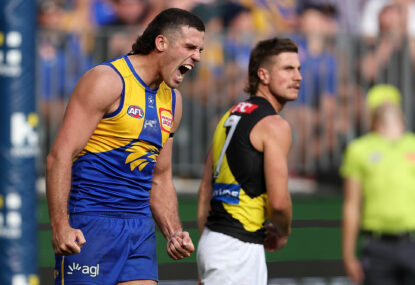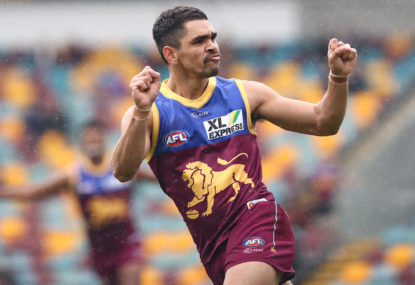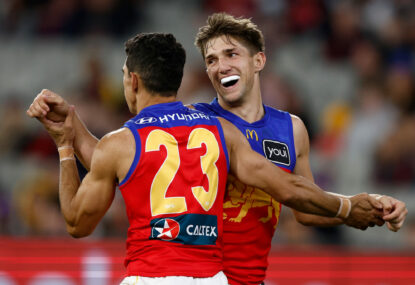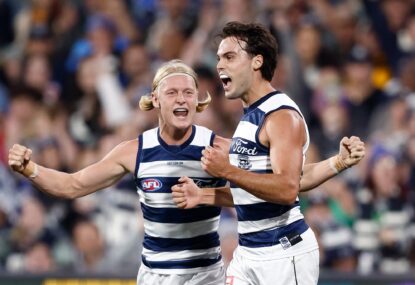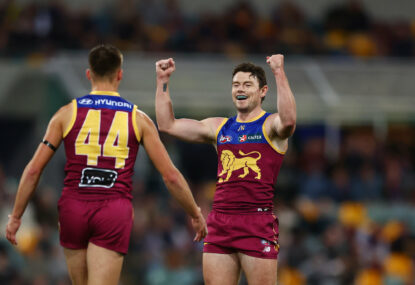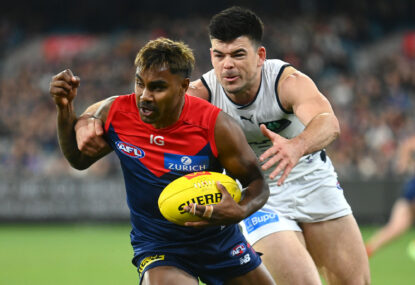Following the news today that Paul Roos has been appointed the new coach of the Melbourne Football Club, long-suffering fans are awaiting with anticipation to see if the club will finally improve its on-field fortunes in the short-term.
The appointment of Roos was met with much fanfare and excitement from all corners of the Melbourne Football Club, who have endured seven long years of little success, two sacked coaches, the retirements and departures of experienced players, the tanking scandal and a boardroom revolt which saw many personnel leave the club.
For the fans, in particular, Roos’ appointment could be seen as the beginning of the end of these dark times. The fans are the ones who want to see Melbourne become a successful club again.
Not since 2006 has the club made the finals, or fielded big names such as David Neitz, Russell Robertson, Matthew Whelan, Adem Yze, Cameron Bruce and Jeff White.
The club has also not had a well established coach since Neale Daniher in the same period of time.
But the appointment of Roos could be the biggest short-term solution to the club’s current on-and-off field woes.
In the last seven years, the Demons have missed the finals, appointed and sacked two untried coaches, been involved in the tanking saga and have had numerous members leave the club in disgrace.
Unlike Dean Bailey and Mark Neeld, who never lived up to their potential in the coaching scene, Paul Roos is experienced and knows what it is like to experience not just success, but the ultimate success.
Roos’ coaching career started at the Sydney Swans in 2002, when he took over from Rodney Eade after the club found itself third from the bottom of the ladder.
He inherited a dispirited side, and turned them into champions, regulars in the side, ambassadors, you name it.
Players like Jude Bolton, Adam Goodes and Brett Kirk started to realise their potential under the coaching of Roos.
Goodes, in particular, went on to become a dual Brownlow Medallist, an ambassador to the Indigenous community and the most capped Sydney Swan in history.
Within four years of his temporary appointment, Roos went on to become a premiership coach, implementing a style of football which was once condemned by Andrew Demetriou as being “ugly”.
Slowing the tempo of the football and flooding were tactics which were used by Roos to great effect.
He also got the best out of other players such as Barry Hall, Craig Bolton, Darren Jolly, Ted Richards, Martin Mattner, Rhyce Shaw, Shane Mumford, Josh Kennedy, Ben McGlynn, and to a lesser extent, Peter “Spida” Everitt.
In 2009 he announced that he would leave the club at the end of the 2010 season, and hand the reins over to John Longmire.
He left the club in a much better state than when he found them.
He left the club having coached 202 games, with a strike rate of just under 58%, and only once missed the finals in a completed season, in 2009.
It was after that season in which the Swans were tipped for a slide further down the ladder after six consecutive finals series. Barry Hall had left the club, albeit in controversial circumstances, while club icons Michael O’Loughlin, Jared Crouch and Leo Barry all retired.
But it was not to be.
During the 2009 draft, they received Shane Mumford, Ben McGlynn and Josh Kennedy from clubs that had won the two most recent premierships (Geelong and Hawthorn; none of these three played in their premiership winning teams), and also recruited Lewis Jetta and Dan Hannebery, the latter of whom won the NAB Rising Star award in 2010.
The 2010 season saw the club return to the finals in Roos’ final year and get to within a kick of the preliminary final.
It was also during that season in which the Swans were beaten by Melbourne by 73 points at the MCG – a match which appeared to mark the end of the Swans and the beginning of the Demons, who were at the time coached by Dean Bailey.
Again, it would turn out not to be and today the Swans remain in the top half of the competition while Melbourne remained mired to the foot of it.
Roos made a rather humorous reference to that match in his first official press conference as Melbourne coach.
Today, under the tutelage of John Longmire, the Swans remain in contention for the premiership and just when it was thought that their time at the top was up, the team’s rebuilding policy paid off and they won a second flag in eight years.
Roos’ legacy in coaching has also been felt at both St Kilda and Fremantle in recent years.
Ross Lyon, an assistant coach when the Swans won their first flag in 72 years in 2005, went on to take St Kilda to three grand finals (2009 and 2010), albeit being unsuccessful on each occasion. He also became the first coach to take the Saints to four consecutive finals series.
His success also carried over to Fremantle, where he will become the first man to coach that club to consecutive finals series for the first time in its history.
Like the Swans, the Dockers are also strong contenders for this year’s flag. That in all is partly due to the no-nonsense coaching of Lyon.
In the end, Roos can be held indirectly responsible for the success that both St Kilda and Fremantle have experienced in recent years.
But how will his coaching journey at Melbourne unfold?
There are many experienced coaches who have returned to the coaching scene in recent times, such as Mick Malthouse, who after Collingwood’s grand final loss in 2011 took a year off before taking on his current role as head coach of the Carlton Football Club, and Rodney Eade, who was coaxed out of retirement in 2005 to mastermind the resurgence of the Western Bulldogs.
Malthouse has now taken Carlton to this year’s finals, though the Blues could be considered to be the lucky losers as they pounced on the finals berth that were vacated by Essendon and the supplements scandal, while Eade took the Western Bulldogs to three consecutive preliminary finals between 2008 and 2010 before moving to Collingwood as a coaching director.
Roos will be the next man to resurrect his coaching career, but coaching the Melbourne Football Club, who have been embroiled in the tanking scandal and the sacking of two untried coaches, will be a challenging and difficult job, one which the man himself has acknowledged.
Melbourne and Roos could learn from what the Sydney Swans went through two decades ago, whereby Ron Barassi was recruited by the club to turn them into a competitive unit following the ill-fated coaching stint of Gary Buckenara.
Barassi turned the Swans from an uncompetitive unit into one that would eventually only miss the finals three times since 1995, produce two unique Brownlow Medallists and one two-time Coleman Medallist. Barassi passed control to Rodney Eade, then Paul Roos, and now, John Longmire.
If Barassi and the Swans could do it, then so too can Roos and Melbourne.
The Demons have also been largely uncompetitive on the field, as proven by their terrible results this season where they lost to Essendon by 148 points, and also suffered a pair of losses to each of the AFL’s expansion clubs.
But despite the mountainous job that he faces, he has stated that he is excited by the prospect of coaching a side which have never really lived up to their potential, with the obvious exception of Jeremy Howe.
His top priority will be trying to keep Colin Sylvia and former number one draft pick Jack Watts, whose career has never really blossomed since being drafted five years ago, at the club.
His tenure at the club will only last for two years, as he would not want to suffer the ignominy of being “sacked” by a club, or being the third coach to be sacked by the Melbourne Football Club in four or five years.
Many fans and players are waiting in anticipation to see Roos, who the Demons made their top target since sacking Mark Neeld in June, in action for the first time since September 2010.
Even AFL boss Andrew Demetriou has welcomed the return of Roos to coaching, almost a decade after Roos earned his ire for the Swans’ then ugly style of play.
There will be many questions asked of Roos’ tenure at the Melbourne Football Club in the years to come.
Turning them into a competitive outfit will be one of them. Another will be whether the players can finally realise their potential, just like Bolton, Goodes, Kirk and co. did at Sydney.
And finally, whether they can return to the finals within a space of (let’s say) five years or so.
The appointment of Paul Roos is no doubt the start of what could be an exciting new era at the club. The dark days are just about to come to and end and we will finally get to see the best that Melbourne have to offer.
Looking at the short-term, I would say that the Demons should aim for 10 victories in 2014; but while it won’t be enough for the club to play finals, it will obviously be a massive improvement from years gone by.
And while Roos will not become Melbourne’s next premiership coach (I just simply cannot see this happening given what has happened in the last seven years), he can at least return Melbourne to where they belong and that is the middle range of the AFL ladder.
Though I’m not a Melbourne fan, I, along with Andrew Demetriou and the rest of the AFL community, will be eagerly anticipating the revival of the Melbourne Football Club within the next five years.





























































































